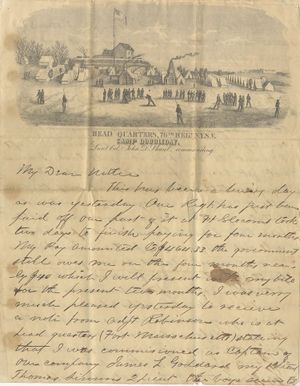1862.104: Difference between revisions
No edit summary |
No edit summary |
||
| Line 78: | Line 78: | ||
|Source Image=camp dday ltrhd.jpg | |Source Image=camp dday ltrhd.jpg | ||
|External Number= | |External Number= | ||
|Submitted by=Bruce Allardice; John Thorn (2022) | |Submitted by=Bruce Allardice (date?); John Thorn (2022) | ||
|Submission Note=Tweet, 2/2/22 | |Submission Note=Tweet, 2/2/22 | ||
|Reviewed=Yes | |Reviewed=Yes | ||
|Has Supplemental Text=No | |Has Supplemental Text=No | ||
}} | }} | ||
Revision as of 13:49, 5 February 2022
| Prominent Milestones |
| Misc BB Firsts |
| Add a Misc BB First |
| About the Chronology |
| Tom Altherr Dedication |
| Add a Chronology Entry |
| Open Queries |
| Open Numbers |
| Most Aged |
Ballplaying Featured on 1862 Letterhead for Camp Doubleday
| Salience | Peripheral | ||||
|---|---|---|---|---|---|
| Tags | Drawing, FamousDrawing, Famous | ||||
| Location | Washington DC or Brooklyn NYWashington DC or Brooklyn NY | ||||
| City/State/Country: | Washington Or Brooklyn, DC or NY, United States | ||||
| Modern Address | |||||
| Game | |||||
| Immediacy of Report | Contemporary | ||||
| Age of Players | AdultAdult | ||||
| Holiday | |||||
| Notables | |||||
| Text |
A. John Thorn:
B. David Block: The 1862 letters of Lester Winslow, of the 76th NY, at the National Archives, feature stationary printed with the heading "Camp Doubleday" "76th New York" and show soldiers playing a bat-ball game. On this David Block writes: "In the foreground of the illustration two soldiers face each other with bats, one striking a ball. Since no other players are involved, the only game that seems to correlate to the image is, in fact, drive ball. If not for Abner Doubleday's association, we would pay this little heed, but it is a matter of curiosity, if not amusement, to place baseball's legendary noninventor in such close proximity to a game involving a bat and ball." | ||||
| Sources |
A. John Thorn, Tweet on 2/2/22. John also notes that the game depicted does not resemble base ball, or wicket, or cricket. B. David Block, Baseball before We Knew It (U Nebraska, 2005), page 198. See also brief Protoball entry on Drive Ball. | ||||
| Warning | |||||
| Comment |
Camp Doubleday is described in an 1896 source as "just outside Brooklyn city limits." See: https://museum.dmna.ny.gov/unit-history/artillery/5th-heavy-artillery-regiment/prison-pens-south; Other sources locate it on Long Island, NY. A third source locates Camp Doubleday in Northwest Washington DC: https://www.northamericanforts.com/East/dc.html#NW
David Block suggests the drawing (below: game is shown near the image's center) shows Drive Ball, a fungo game: see Baseball Before We Knew It , page 198. See also Drive Ball.
One auction house in 2015 claimed "This is perhaps the very first piece of American stationery depicting Union soldiers playing baseball. Amazingly, this lithograph has it all by showing Union soldiers at play in Camp Doubleday which, of course, was named after the game's creator Abner Doubleday!"
From John Thorn, 2/22/22: "Lithographer is Louis N. Rosenthal of Philadelphia. Born 1824." See https://digital.librarycompany.org/islandora/object/digitool%3A79709 Edit with form to add a comment | ||||
| Query | So, was Abner Doubleday actually connected to this DC Army facility? And/or the downstate NY facility? Is it clear why someone would create such a letterhead? Can we find a fuller description of drive Ball? There were actually two Camp Doubledays? Why? Which one is pitured on the letterhead? How does Protoball give a source for John's Tweet?
Edit with form to add a query | ||||
| Source Image | |||||
| External Number | |||||
| Submitted by | Bruce Allardice (date?); John Thorn (2022) | ||||
| Submission Note | Tweet, 2/2/22 | ||||
| Has Supplemental Text |
Comments
<comments voting="Plus" />

